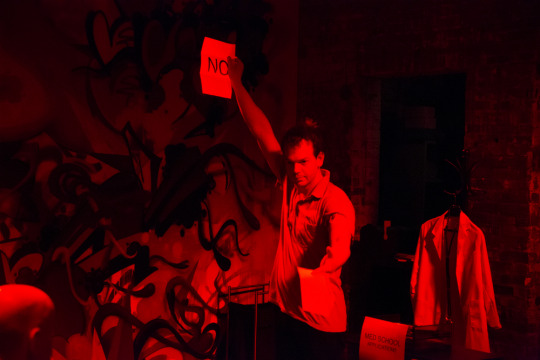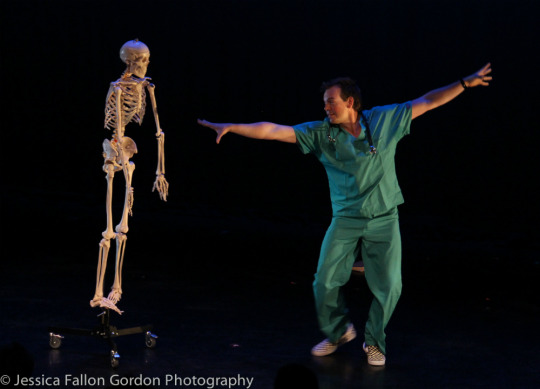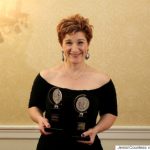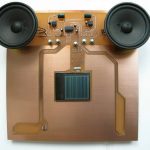PURSUING HIS CALLING: A CONVERSATION WITH FISCALLY SPONSORED ARTIST MATT WILSON
“The Ridiculous is experienced, not observed.”
Performer, humorist and once upon a time pre-med student Matt Wilson is anything but afraid of clowns. In his solo performance, Clown Baggage, Wilson performs a “neo-vaudevillian spectacle,” treating his audience to an unpredictable tangle of clowns, doctors and corporeal investigation. His eclectic brand of humor examines healing, careers and callings. Wilson thoughtfully joins us to share his creative process and opinions about professions. You can check out Wilson’s upcoming performance of excerpts from Clown Baggage on June 26th through City Center’s Lobby Project.
WHAT: Matt Wilson will be performing excerpts from Clown Baggage through the Lobby Project at City Center. The Lobby Project is presented in tandem with Encores! Off-Center productions and is only open to ticket holders of that evening’s performance. Find out more about the Lobby Project here.
DATE: June 26, 2015
TIME: Clown Baggage is at 7:00 PM, curtain for A New Brain is at 8:00 PM
COST: Free but only open to ticket holders of A New Brain
NYFA: I am delighted to discuss your project Clown Baggage with you! “Matt wanted to be a doctor. He also wanted to be a clown. Now he’s got baggage.” As soon as I read the title and its tagline I burst out laughing. Can you discuss the events that led you to clown college?
Matt Wilson: I first learned there was a clown college from an Episcopalian minister whose daughter went to my Catholic high school, where we performed in the musical Godspell together. He served as a chaplain for the Ringling Bros. Barnum and Bailey Circus and hung a recruitment poster outside our Guidance Counselor’s door (next to every other esteemed institution of higher learning). When I was a junior, I called the number on the poster, and got an application in the mail. I promptly hid it in the desk in my bedroom. Every now and then I would pull it out, and look at the pictures, and attempt some of the essay questions (seriously, the questions on the Clown College application rivaled the questions I answered when I finally applied to Vassar College). It wasn’t until my third year of College when I auditioned for Clown College, and received an actual invitation to apply. That was around the same time I applied to Medical School. I got rejected from both.
NYFA: How did you begin building your career as a performer and humorist?
MW: Great question, because I often don’t look at my pursuits as amounting up to a career. (And I’ve never thought of myself as a humorist, so thanks for that!). One of the questions I try to answer for myself with Clown Baggage is, “why do I do what I do?” For me, it’s been a very non-linear patchwork of opportunities, endless hustle, amazing experiences and emotional implosions.
I was a pre-med student at Vassar College and majored in Biophysics. I also started a juggling and circus arts group on campus called the Barefoot Monkeys, which I am very proud to say is still active. I sang in the opera program and served as an Emergency Medical Technician. I responded to emergencies on my unicycle because I got there faster than the ambulance.
The thing is, I thought that performing was selfish, but pursuing a career in medicine was selfless. The summer between my junior and senior years I reconciled this existential debate. I finished applying to medical school, I took the MCATS, and I moved to NYC and became a Clown Doctor, among other creative pursuits in musical theater, experimental theater, TV and film.

NYFA: Did you meet anyone else with similar career baggage while studying?
MW: I’ve met artists with backgrounds in the sciences and doctors with backgrounds in the arts. It’s quite common. Stephen Pressfield (novelist and author of some amazing books for artists like The War of Art and Turning Pro) talks about this notion of a shadow career, where we sit on the sidelines of our passion. Many folks get wrapped up in jobs that hint at the occupation they’re truly passionate about rather than pursuing their true calling. That’s part of Clown Baggage—what do you want to be when you grow up? Why do you want to be that? And what happens when you unleash these passionate desires into the world?
NYFA: What is your process like for developing new material?
MW: It depends. I love love LOVE sideshow. I’m obsessed with the form, and particularly how to use these skills to tell a story. Sideshow refers to a show on the side of a main event that was typically populated with live acts and oddities such as humans and animals with extraordinary anatomical features and abilities. Contemporary sideshow often refers to acts and artists following in that tradition: fire-eating, sword-swallowing, regurgitation, feats of strength. I’m similarly enamored with variety, circus arts and pretty much any bold theatrical device used for storytelling, whether it’s musical, dance, opera, puppetry, magic, vaudeville-esque, or melodrama.
I create a physical collage, using various media. Sometimes I have an idea for an act or an image that I want to play with. It starts with a song or a task. I want to get inside a 6 foot balloon. I want to escape from a straitjacket. I want to eat fire. How do I build this into an engaging piece of theatre? Or, how do I want people to interact with me on the street? On the subway? On stage? How do I want to document this? Is it a still image? A video? Or is it a live, temporal, moment that will only be experienced in person?
I’ll sit with an idea, sometimes for a few days or sometimes for years, and let it marinate. Maybe sketch out some points or images I really want to hit. Maybe I write a description. Eventually, I have to put something up on it’s feet, usually in my living room. And it doesn’t usually feel as good on its feet as it does in my head! Then the work begins. I used to think I needed to wait until I was in front of an audience to determine if an idea had legs. Now I’ve learned that almost anything I sit with, and work through is going to have some kind of a future—I just don’t know what.
NYFA: How do you keep the performance fresh for the audience while sustaining your interest and fulfillment as a performer?
MW: Hmmmm…I feel obligated to my audience in that we are entering a covenant. They share their time and attention (and their money) and I share myself. I always want to respect that agreement. It also depends on the stage of development. I often feel like I have to be a little more selfish with new work since I need my audience to help develop it. I won’t know until I feel how an audience responds [when] I’m sharing something that I’m not totally sure about. I actually prefer repetition and the chance to grow and sit with a piece through multiple performances over time. Working out the kinks of new pieces is definitely a little more exciting when I’m stoked to show it to someone. As long as I feel prepared, then I can play and the piece stays fresh.
NYFA: Simultaneously harbingers of joy and inducers of fear, clowns and doctors alike occupy a tenuous place in American culture. I think it is interesting that you straddle both roles. What do you value about your ability to occupy such a liminal space?
MW: It’s interesting—as I learn to define my current role as an artist and refine my POV, I spend a lot of time contemplating this liminal space and why it appeals to me. It starts with the fact that I wanted to be a doctor and I also wanted to be a clown. But I have some very early memories with doctors and clowns (as I’m sure we all do) and they both really freak me out. So I don’t know if I truly value it [my capability to occupy liminal space] as an ability in myself. It’s really an outcropping from me sorting out my own baggage with doctors, clowns, careers, callings and the practice of healing.
The way I see the world is unique and the connections I make have value to me. I have a manifesto on what I call the Pursuit of the Ridiculous that sums up my approach to art and life.
I believe…
1. The Ridiculous is Sacred—it’s bigger than us.
2. The Ridiculous is not precious.
3. The Ridiculous is a paradox—a finite moment, yet infinitely possible. Must be pursued, discovered, encountered but cannot be commanded or scheduled.
4.The Ridiculous is universal.
5.The Ridiculous is a genuinely human encounter—it’s becoming more and more critical the more technologically removed we become from the world.
6.The Ridiculous is experienced, not observed.
7. The Pursuit of the Ridiculous is a practice—it starts with an offer, it’s show and tell, it’s an invitation.
8. The Pursuit requires permission. Otherwise it’s assault.
9. It’s a battery that can recharge you—on the surface, it may seem like one more thing, a drain, another chore, an expenditure. But that’s resistance. That’s the opposite of Ridiculous. That’s Banality talking. That voice is the voice that steals moments, compresses time.
10. The Ridiculous is not…until it is.
11. It’s also not that deep.
12. The Ridiculous is rigorously regimented spontaneity.
13. The Ridiculous subverts the ego.
14. The Ridiculous cannot be controlled—it is not polite, it cannot be shushed. It can only be invited.
15. The Ridiculous involves acknowledging and existing in the chaos of the moment.
16. The Pursuit of the Ridiculous is a gauntlet. Perpetual challenge.
NYFA: What connections do you discover through your role as a practitioner of each discipline?
The human connection. We are all humans and we are all desperate for connection. Part of the human condition is to belong, to be heard, to be acknowledged and validated. Healing requires connection on a visceral level. So does my Pursuit of the Ridiculous. In medicine, you might describe that connection as bedside manner. In my work, it’s called connecting with your audience.

NYFA: Clown Baggage has an uncanny appeal to a broad audience. The notion of a psychological impediment, whether it be left over from a breakup or a job, is intimately familiar to the human experience. Everyone has baggage. How does your previous medical training, understanding of the body and interest in science inform your performance practice?
MW: I guess my performance practice is a synthesis of all my interests, obsessions and guilty pleasures. I love all the sciences, particularly anatomy and physiology. I adore medicine and medical curiosities. I definitely see a very concrete connection to sideshow; sideshow demands a blend of technique and knowledge of the human body.
One hybrid performance/science experience really captures this intersection of my passions. I was a guest lecturer in the NYU Neuroscience department, led by Dr. Wendy Suzuki (who just released her first book Healthy Brain, Happy Life, check it out!). The course explored the impact on the brain of both the act of creating and receiving of a creative act. My contribution included sharing my work as a clown and my process for creating. We encouraged the students to design an experiment that would quantify the impact of creativity on the brain. Art meets Science. Boom.
NFYA: How did you determine NYFA Fiscal Sponsorship was a good fit for Clown Baggage?
MW: I met this amazing artist, author and teacher, Gigi Rosenberg. She wrote The Artist’s Guide to Grant Writing (this is a critical resource for all artists! Read it. Read it again. And when Gigi swings into your town, meet with her and tell her I say hi!). She introduced me to the NYFA Fiscal Sponsorship program.
The process in applying for Fiscal Sponsorship is so comprehensive—it allowed me to evaluate how to pursue my art-making from beyond the creative side. It’s important to have something to say, but it’s imperative to know how to share it. If you can’t share it, how will you impact the lives of others with your work? Applying for NYFA Fiscal Sponsorship parallels the process you encounter every time you apply for a grant, or a funding opportunity. That’s an invaluable exercise for every artist. You have to be able to talk about your work, understand the financial implications of making your work, be able to express yourself as an artist outside of your work. NYFA Fiscal Sponsorship is an avenue that helps you try that on for size.
NYFA: Congratulations on being the recipient of a NYFA Opportunity Grant in 2014! This grant is available to NYFA’s fiscally sponsored artists and provides funding for artists to take advantage of specific opportunities to benefit their work and career development. What is the impact of this grant upon your work?
MW: Being a solo artist can feel very lonely. I’ve learned that collaboration is the name of the game. Stephen Sondheim implores it in Into the Woods that “no one is alone.” That’s so important.
The NYFA Opportunity Grant was impactful in a number of ways. It was my first grant, so that alone was a big deal! I might sound silly, but when I was sitting at the table for a luncheon to introduce the grantees to the funders I was really moved. I was being recognized as an artist, with things to say, and people that wanted to hear me. More than that, they felt an obligation to make sure my ideas made it out into the world. That’s huge. It’s validating, humbling, and exhilarating for people to recognize you as an artist, and say, “Hey, what you’re doing is interesting, and I think it should be seen.” It provided a very concrete source of support. Ideas are great, but action is what counts, and this grant allowed me to take action. It helped fund a design process with the Puppet Kitchen to bring a piece from my show to life. I’ve been wanting to dance with a skeleton for over two years. This grant helped bring my Dance Macabre from Clown Baggage to life. This excerpt premiered this year at the Choreographer’s Canvas, produced by Justin Boccitto and Group Theatre Too, and will also appear in my performance as a part of City Center’s Encores! Off-Center Lobby Project on June 26th.
NYFA is the proud Fiscal Sponsor of Matt Wilson’s Clown Baggage. Follow Clown Baggage on Facebook for your prescribed dose of humor! Applications for NYFA’s Fiscal Sponsorship program are due June 30. Click here to learn more and apply.
– Interview conducted by Madeleine Cutrona, Program Assistant, Fiscal Sponsorship
Images, from top: Dance Macabre from Clown Baggage, Photo credit: Jessica Fallon Gordon; The Physical from Clown Baggage, Photo credit: Allison Stock; Rejection from Clown Baggage, Photo credit: Michael Wiltbank





